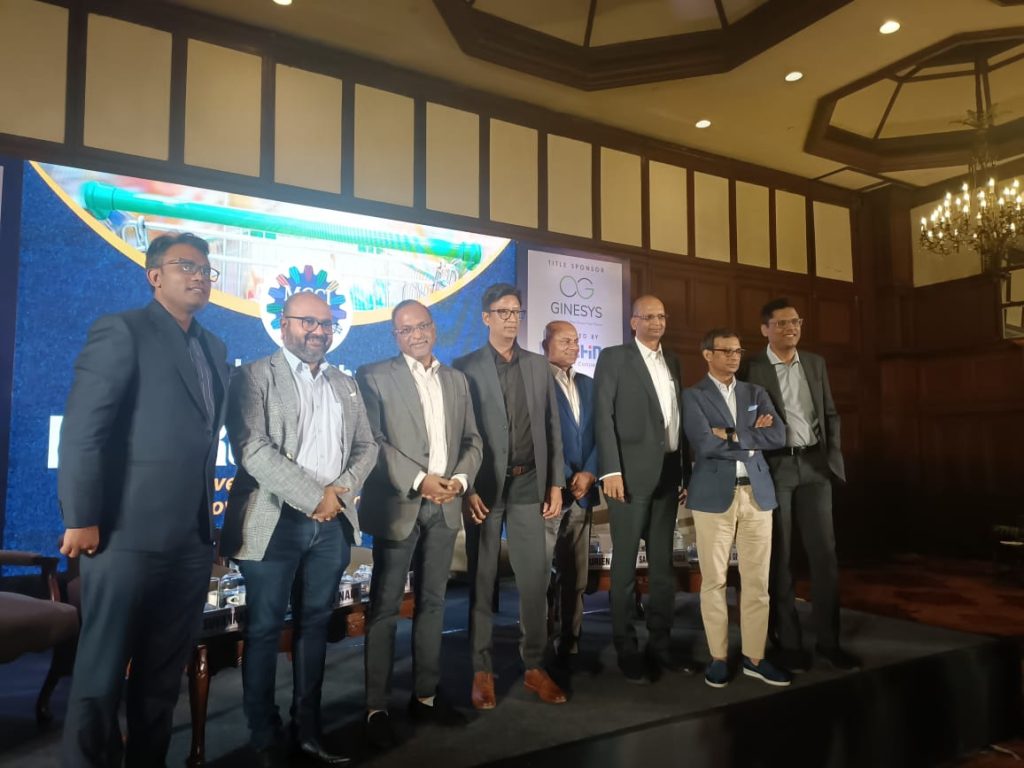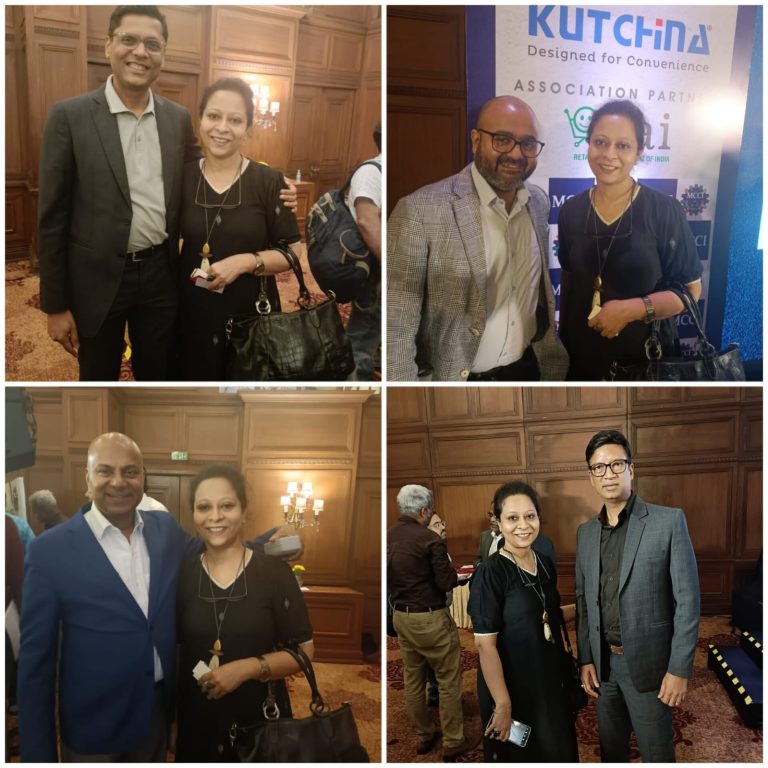Merchants’ Chamber of Commerce & Industry organised MCCI Retail Conclave on “Reinventing Retail Through Innovation and Technology” on Saturday, May 6, 2023 at Taj Bengal, Kolkata. The main speakers were Shri Bijou Kurien, Chairman, Retailers Association of India, Shri Gunjan Shah, Managing Director and CEO, Bata India Ltd, Shri Venu Nair, Managing Director and CEO, Shoppers Stop Ltd, Shri Sandeep Barasia, Whole Time Executive Director and Chief Business Officer, Delhivery and Shri Suvankar Sen, Managing Director and CEO, Senco Gold Ltd.
Shri Namit Bajoria, President MCCI, delivered the welcome address. He emphasised the growing importance of the retail sector, stating that competition value is expected to expand to $400 billion by FY25, with e-retail expected to grow to $120-140 billion. He even said that retail has been evolving for a long time and it was not that everything has settled down at present. Retail will have to get adapted to newer technologies if it had to sustain.
Bijou Kurien said that the total digital transaction at present 65% were UPI and 130 million people have started buying through e- commerce or online platform. There were 13- 15 million shopkeepers in India at present that contributed to 80% of the retail business. Organised retail contributed 10-12% of the total retail business and online retail around 4-5%. He even said 60% of the retail market was of food and groceries and 40% of the market was fashion and life style. But retail space was a constraint in India and it was only one tenth of the US and one fourth of China.

Venu Nair, Managing Director and CEO, Shoppers Stop announced that in the East, Shoppers Stop is growing aggressively. Along with that he also announced the opening of India’s largest beauty store in Kolkata in the next 6 months. Although he didn’t mention about the investments to be made in the beauty space, he said, Shoppers Stop has been rolling out 18-20 beauty stores in India every year. The store will be more of a concept than a traditional outlet, with details being kept under wraps for now.
Beauty is an important segment for Shoppers Stop, contributing around 17 per cent to the company’s revenue. The company has already launched 11 standalone beauty stores last year and is planning to open 15-20 more such stores every year for the next. In addition, the company plans to open 12-15 departmental stores every year for the same frame. Shoppers Stop is also partnering with Shiseido Asia Pacific Pte. Ltd., a Japanese firm, to expand the Nars cosmetics brand’s footprint in India. Nair stated that the Nars cosmetics standalone store is expected to open in August-September. Shoppers Stop registered the highest-ever revenue of Rs 5,066 crore in FY23.
Suvankar Sen, Managing Director and CEO, Senco Gold, shared the story of his journey in becoming a Rs 4000 crore company. Most significantly he remarked that data analytics helps retail companies to understand the customers’ buying needs and focus on areas that have high demand. The conclusion derived from data helps the companies to forecast the demand and accordingly manage the inventory. Data helps one to understand and improve business processes so we can reduce wasted money and time. Every company feels the effects of waste. It depletes resources, squanders time, and ultimately impacts the bottom line.
“While 60% of the jewellery players were in the organised segment, 40% were in the unorganized segment”. GST and other newly formulated auditing conditions were leading the jewellery players to move into the organised segment. The diamond jewellery segment was growing at the rate of 25%, though it would increase exponentially with the lab grade diamonds coming more to use, Sen said adding bridal jewellery, which was 60% of the overall jewellery market has come down to 50% of the jewellery market with lighter jewelleries taking the place, mainly used with western wears and formal dresses.
While all the speakers stressed on the use of technology and adopting the hybrid model to run and grow their businesses, post Covid, stores have started opening up, Sen stressed that to grow in business one should keep a goal. Businesses would require to keep an eye on trends, technology and training its team, which should match the vision of the business owner.
Bata’s managing director and CEO Gunjan Shah said that the Bata shoes have turned from a functional brand to a fashion brand. Casualization has taken a major place in the footwear market and for companies to sustain, will be required to be amenable to changes. He even said that while they sell both via our site and e-tailing marketplaces, they have a home delivery service, too — where, in case a product is not available in one store, it gets picked up later from another store or a warehouse to be delivered at the customer’s doorstep. Also, they have a store on Facebook and are targeting consumers on Instagram through aggressive influencer marketing for all their brands. The online channel is now the fastest-growing revenue channel. They are present across all key marketplaces. A major chunk of the revenue comes from home delivery and online marketplaces; the balance is contributed by their own website.
Bata’s offline sales currently account for 90% of the revenue, where 75% is through owned and franchise stores and 15% through MBOs. The footfall trends are improving significantly, and are growing in terms of consumer confidence, every week. But according to him, footfalls will be a constraint. To gain more traction, they have refurbished a large part of the network in the last few months.

According to Sandeep Barasia, of Delhivery, logistics was the last thing that businesses brought into consideration but logistics plan should be made at the drawing board level. Due to the increasing digitization of retail, logistics is becoming a critical component of any successful enterprise’s foundation. According to him, the better the logistics, the happier the customers are. The happier the customers are, the more sales and brand loyalty created. The logistics industry was $200 billion industry and would grow to $ 300 billion industry in the next five years.
When applied to e-commerce, Barasia said that the process enables businesses to ship orders to customers. If somebody is running an e-commerce site, he will come across the term logistics management. As a retailer, the role in logistics management is to pinpoint potential shipping and distribution companies and evaluate their effectiveness. He added more than 4.5 million trucks operated in India but most businesses didn’t look logistics as a strategy. He said that growth without profitability is not going to be sustainable and for high growth to happen, there has to be a high market opportunity.
In MCCI Retail Conclave 2023, Prashant Lohia, Founder and CEO of Ginesys One delivered a session on how emerging technologies will shape the future of retail. He importantly remarked on Artificial intelligence which can help retailers provide the best possible customer experience. Improvements range from reducing shopping time with automated checkouts to more personalized discounts to offering round-the-clock customer service with chatbots. can support retail operations, increasing profits and optimizing business processes. Specific benefits include automation, loss prevention and sustainability. It can also bring down costs, optimize supply chains and increase customer satisfaction.
All the speakers primarily lodged on the changing face that retail was beholding and also talked about product innovation citing use of augmented reality and virtual reality in attract customers in the retail stores.















